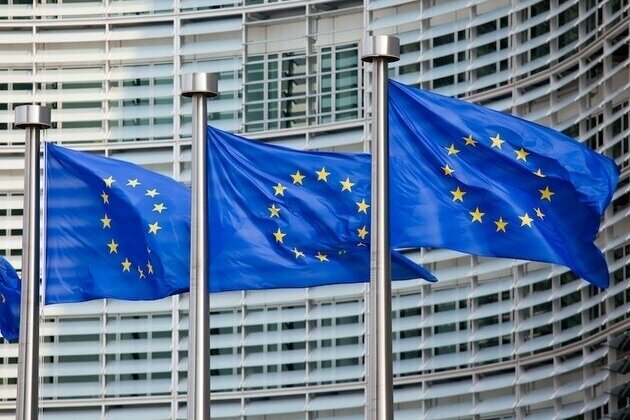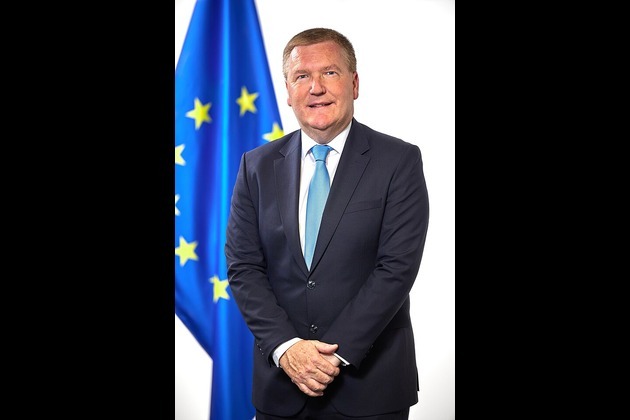Opinion Oligarchic Constitutionalism in Europe A Warning from Within
E-International Relations
30 Jun 2025, 16:06 GMT+10

Salvador Santino Regilme
Download PDF
Jun 30 2025
4
viewsjorisvo / DepositphotosEurope is not just facing a cost-of-living crisis. Behind the headlines of inflation, austerity, and social unrest lies a deeper structural transformationone that risks turning the European Union into a democracy for the rich. While millions struggle with precarity, Europes wealthiest citizens are entrenching their power in law, policy, and media. As wages stagnate, housing becomes unaffordable, and social protections wither across the continent, another reality thrivesone of extreme privilege and influence. (Crdenas-Garca, Mesa, and Castro 2021; Tsoukalis 2012; Ioannou and Charalambous 2024; Palley 2013) The super-rich are not merely surviving Europes overlapping crises; they are quietly reshaping its constitutional and political order to suit their interests. Their power is not incidental. It is systematically embedded in the legal frameworks, governance structures, and public narratives that define the European Union today.
In my recentarticlein the Journal of Common Market Studies, I argue that Europe is evolving into an oligarchic constitutional order: a system where the governance of society increasingly protects the accumulation of private wealth while hollowing out the principles of democracy, equality, and human dignity (Regilme 2023; 2024; 2025). Unless this trajectory is reversed, Europes democratic promises risk collapsing into mere ceremony, concealing deep structures of inequality. In that article, I use the term oligarchic constitutional order to describe a system in which the formal structures of democracyelections, legal norms, constitutional textsremain intact, but their substance is gradually reoriented to serve the interests of the ultra-wealthy. Rather than dismantling democratic institutions outright, this order repurposes them to entrench inequality, shield capital from public accountability, and normalize economic exclusion as politically legitimate. Laws are written and interpreted to protect property over people; budget rules are codified to prioritize investor confidence over social need; and supranational institutions increasingly act as enforcers of market discipline, not democratic oversight. My hypothesis is that Europe may be evolving toward such a constitutional orderone where governance appears democratic in form, but increasingly functions in ways that reproduce oligarchic power. This trajectory, if left unchallenged, risks transforming the EUs foundational promises of solidarity and equality into formalities that conceal rather than correct structural injustice.
The numbers reveal the stakes. Amid a historic global pandemic, the worlds billionaires saw their fortunesgrow by nearly 38%, reaching $13.1 trillion, even as millions of workers faced mass unemployment and social insecurity. In Europe alone,billionaires amassed $2.8 trillion, with luxury dynasties such as LVMH in France and the Quandt family in Germany expanding their fortunes. This surge in elite wealth is not a random by-product of globalization; it is the result of deliberate political choices. Since the 1970s,top income tax ratesacross Europe have collapsed, and public services have been systematically rolled back. The Maastricht Treatys rigid fiscal rules enshrined austerity and market liberalization into the constitutional fabric of the EU, prioritizing financial stability over social solidarity (Gill and Biscahie 2022; Lucarelli 2014).
While many Europeans still imagine the EU as a bulwark of social protection, the reality is that constitutionalized austerity and deregulation have made it easier for capital to flow freely while leaving the majority of citizens more precarious than ever (Blyth 2013; Mexhuani and Mexhuani 2024; Berman and Snegovaya 2019). Wealthy elites have not merely adapted to these structuresthey have actively shaped and captured them. In Hungary, for example,EU agricultural subsidiesintended to support small farmers have been systematically siphoned off to enrich Prime Minister Viktor Orbns political allies. At the supranational level, European tax havens like Luxembourg and Ireland have helped the super-rich legally shelter vast fortunes, undermining national tax systems and accelerating inequality .(Oxfam 2023; Ogle 2025)
Yet the control of political institutions is only part of the story. Europes billionaires have also captured the public sphere, shaping how inequality is perceived and justified. Media moguls such asVincent Bollorhave turned outlets like CNews into engines for far-right propaganda, while powerful business families use ownership of newspapers and broadcast networks to mute criticism and champion neoliberal orthodoxy. Even philanthropy, often portrayed as noble altruism, becomes a tool to launder reputations, deflect regulatory scrutiny, and distract from demands for structural redistribution, as seen in the heavily marketed giving back initiatives championed by elites.
A more dangerous phenomenon still is how the language of human rights and fairness has been weaponized to defend elite privilege. Public narratives increasingly blame poverty on individual failure rather than structural exclusion. AsDavid Cameronfamously claimed, poverty stems from personal issues like alcoholism and drug addiction, not the systemic dismantling of welfare protections and labor rights. This individualization of social failure masks the true dynamics of inequality and transforms injustice into personal inadequacy. Meanwhile, strategic litigation by corporations at bodies like theEuropean Court of Human Rightstwists the principles of freedom and property rights into weapons for protecting the super-rich against democratic accountability.
Throughout all of this, a profound hypocrisy festers. The European Unions founding treaties solemnly commit it tohuman dignity, democracy, equality, and solidarity. But in practice, the EUs constitutional structure has prioritized the freedom of capital over the welfare of people, reinforced oligarchic power over collective rights, and protected market access over political equality. Europes political economy today is better described as one of systemic stratification, not solidarity. The myth that oligarchy is a uniquely Russian or Global South problem must be shattered. Europe has its own oligarchs: billionaires who shape elections, lobby politicians, dominate public discourse, and systematically defend systems of extreme privilege (S. S. Regilme 2024). What distinguishes them is not their behavior but their ability to cloak it in the language of legality, stability, and progress. The good European oligarch is a dangerous fiction that blinds citizens to how democracy is being hollowed out from within.
The challenge ahead is immense. Tinkering with transparency rules or minor tax reforms will not be enough. Confronting Europes oligarchic drift demands a fundamental reimagining of governance, law, and public discourse. It requires new research agendas that center elite agency and expose how constitutions, regulations, and ideologies are manipulated to entrench wealth. It demands political movements that refuse to accept that inequality is natural, and that resist the normalization of democratic decay.
Without structural transformation, Europe risks becoming an elegant museum of democratic ideals: admired by tourists, abandoned by citizens, and ruled in practice by an increasingly unaccountable aristocracy of wealth. The time for illusions is over. The super-rich are not the saviors of Europes democratic future. They are, increasingly, its silent undertakers.
References
Berman, Sheri, and Maria Snegovaya. 2019. Populism and the Decline of Social Democracy. Journal of Democracy 30 (3): 519.https://doi.org/10.1353/jod.2019.0038.
Blyth, Mark. 2013. Austerity: The History of a Dangerous Idea. New York City: Oxford University Press.
Crdenas-Garca, Jaime F, Bruno Soria De Mesa, and Diego Romero Castro. 2021. Capitalism Has No Clothes: The Unexpected Shock of the Covid-19 Pandemic. Perspectives on Global Development and Technology 19 (56): 54564.https://doi.org/10.1163/15691497-12341570.
Gill, Stephen, and Thibault Biscahie. 2022. New Constitutionalism and the EU: Its Limits and Prospects beyond the COVID-19 Pandemic. New Political Science 44 (4): 52444.https://doi.org/10.1080/07393148.2022.2129925.
Ioannou, Gregoris, and Giorgos Charalambous. 2024. Critical Junctures, Ideological Continuity and Change in Western Europe: Comparing the Pandemic and the Global Financial Crises. Global Society ahead-of-print (ahead-of-print): 128.https://doi.org/10.1080/13600826.2024.2359953.
Lucarelli, Bill. 2014. The Euro: A Currency in Search of a State. The Economic and Labour Relations Review 25 (3): 48496.https://doi.org/10.1177/1035304614548962.
Mexhuani, Fitim, and Burim Mexhuani. 2024. Authoritarian Neoliberalism Debates: A Critical Review of the Literature in Central and Eastern Europe. New Perspectives 32 (2): 14561.https://doi.org/10.1177/2336825241230935.
Ogle, Vanessa. 2025. Noblesse Without Oblige. Dissent 72 (1): 13135.https://doi.org/10.1353/dss.2025.a950174.
Oxfam. 2023. Survival of the Richest: How We Must Tax the Superrich Now to Fight Inequality. January 1, 2023.https://www.oxfam.org/en/research/survival-richest.
Palley, Thomas I. 2013. Europes Crisis without End: The Consequences of Neoliberalism. Contributions to Political Economy 32 (1): 2950.https://doi.org/10.1093/cpe/bzt004.
Regilme, Salvador Santino. 2023. Constitutional Order in Oligarchic Democracies: Neoliberal Rights versus Socio-Economic Rights. Law, Culture and the Humanities 19 (1): 12643.https://doi.org/10.1177/1743872119854142.
. 2024. Europes SuperRich: Towards Oligarchic Constitutional Order. JCMS: Journal of Common Market Studies.https://doi.org/10.1111/jcms.13702.
. 2025. Oligarchic Rivalry: USChina Tariffs and the Global Politics of Inequality. Transforming Society. May 27, 2025.https://www.transformingsociety.co.uk/2025/05/27/oligarchic-rivalry-us-china-tariffs-and-the-global-politics-of-inequality/.
Tsoukalis, Loukas. 2012. European Disintegration?: Markets, Institutions, and Legitimacy. Journal of Democracy 23 (4): 4753.https://doi.org/10.1353/jod.2012.0073.
Further Reading on E-International Relations
- Opinion Coronavirus: Beyond Europes North-South Divide
- Opinion Weakened US Relations Is Pushing Europe Towards China
- Opinion Europes Lagging Position on Microprocessors
- Opinion Europe is Still Able to Build Tanks
- Opinion The Good, the Bad and the Ugly of COVID-19 Recovery Financing in Europe
- Opinion Europe Has Never Been A Garden
About The Author(s)
Salvador Santino Regilmeis an Associate Professor and Chair of the International Relations Program at the Institute for History, Faculty of Humanities at Leiden University.
TagsEuropean UnionOligarchic Constitutionalism
 Share
Share
 Tweet
Tweet
 Share
Share
 Flip
Flip
 Email
Email
Watch latest videos
Subscribe and Follow
Get a daily dose of Dutch Sun news through our daily email, its complimentary and keeps you fully up to date with world and business news as well.
News RELEASES
Publish news of your business, community or sports group, personnel appointments, major event and more by submitting a news release to Dutch Sun.
More InformationInternational
SectionDeepSeek faces app store ban in Germany over data transfer fears
FRANKFURT, Germany: Germany has become the latest country to challenge Chinese AI firm DeepSeek over its data practices, as pressure...
Canadian option offered to Harvard graduates facing US visa issues
TORONTO, Canada: Harvard University and the University of Toronto have created a backup plan to ensure Harvard graduate students continue...
Israel should act fast on new peace deals, Netanyahu says
JERUSALEM, Israel: Israeli Prime Minister Benjamin Netanyahu says that Israel's success in the war with Iran could open the door to...
UN offer rejected in Dreamliner crash investigation
NEW DELHI, India: India has decided not to allow a United Nations (UN) investigator to join the investigation into the recent Air India...
UN climate agency gets 10 percent boost amid global budget cuts
BONN, Germany: Despite widespread belt-tightening across the United Nations, nearly 200 countries agreed this week to increase the...
Mexican President orders review of SpaceX environmental impact
MEXICO CITY, Mexico: Mexican President Claudia Sheinbaum said this week that her government is investigating possible environmental...
Europe
SectionDeepSeek faces app store ban in Germany over data transfer fears
FRANKFURT, Germany: Germany has become the latest country to challenge Chinese AI firm DeepSeek over its data practices, as pressure...
EU Commissioner says Kallas meant no offense to Ireland
DUBLIN, Ireland: Ireland's EU Commissioner Michael McGrath has defended Commission Vice President Kaja Kallas over her recent comments...
Apple allows outside payment links under EU pressure
SAN FRANCISCO, California: Under pressure from European regulators, Apple has revamped its App Store policies in the EU, introducing...
UN climate agency gets 10 percent boost amid global budget cuts
BONN, Germany: Despite widespread belt-tightening across the United Nations, nearly 200 countries agreed this week to increase the...
Kate Winslet's visit sparks profit jump at Ballymaloe Cookery School
DUBLIN, Ireland: Post-tax profits at Ballymaloe Cookery School rose by 53 percent in 2024 to 135,952 euros, helped by the buzz around...
Woman sues Boots in Ireland, blames migraine drug for brain bleed
DUBLIN, Ireland: A 63-year-old woman, Sigrid O'Meara from Ballincurry, Longford, is suing Boots Pharmacy in the High Court. She says...











